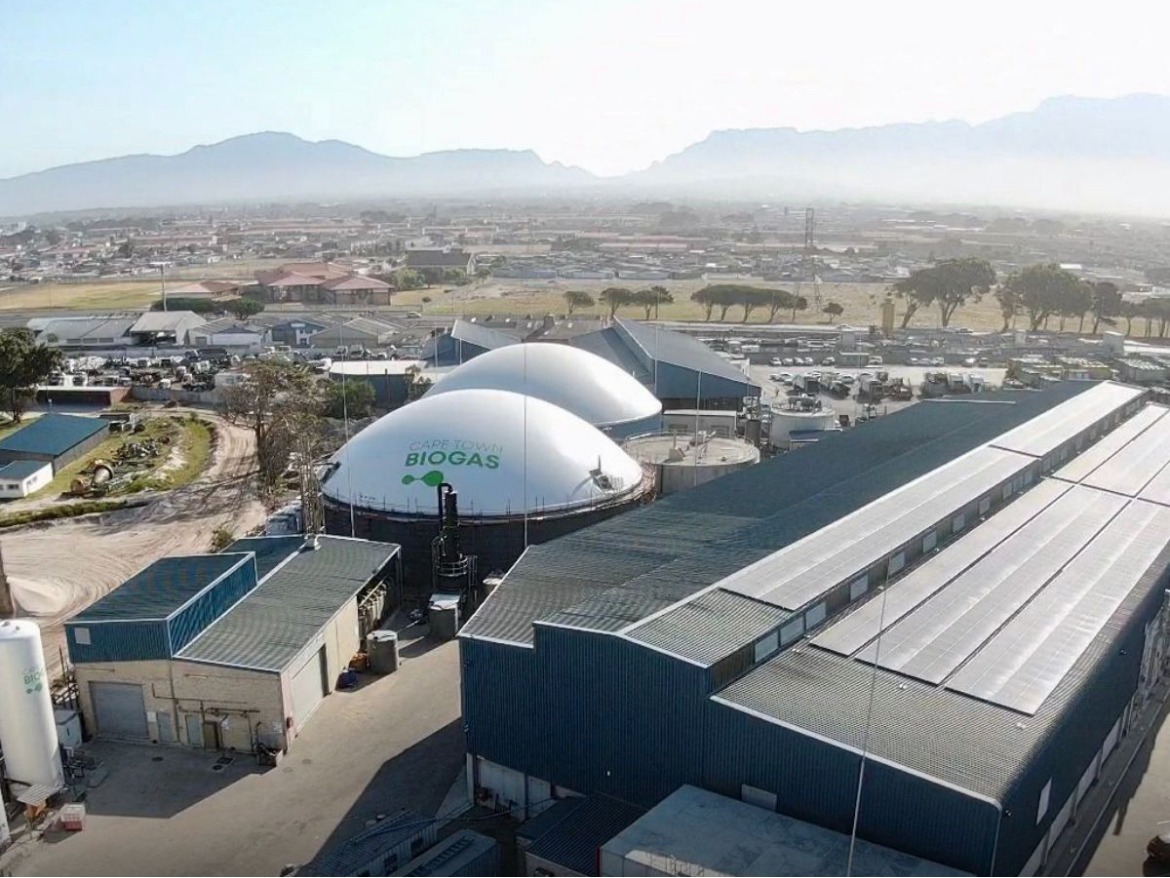
New Horizons Waste to Energy (RF) Pty Ltd
Cape Town Biogas Pty Ltd
Mounting pressure on landfill space to accommodate increasing volumes of waste is a major challenge for Cape Town, but it also represents an opportunity to build a greener economy. In 2017, a consortium led by New Horizons Waste-to-Energy, supported by the Industrial Development Corporation (IDC), Clean Energy Africa Investments, WasteMart, and Afrox launched a large-scale biogas facility in Athlone to demonstrate a sustainable alternative to landfilling organic waste. The project is strategically located next to the Athlone Refuse Transfer Station to intercept organic waste streams and convert them into energy and valuable by-products. Following a recent acquisition, New Horizons Waste-to-Energy now operates under Cape Town Biogas, with Anaergia Africa providing the biogas technology and technical expertise that support the facility’s ongoing operations. The facility was established to address a gap in available, scalable solutions for organic waste, particularly for municipalities and industries struggling with rising waste volumes. It offers a practical circular-economy approach by converting organic waste into usable energy and by-products.
Cape Town Biogas (CTB) employs advanced anaerobic digestion technology to transform organic waste (including food waste and sewage sludge) into biomethane, beverage-grade CO₂, and organic fertiliser. Unlike conventional waste management, which typically relies on landfilling mixed municipal solid waste, this approach diverts the organic fraction before it reaches landfill, allowing for the generation of renewable energy and valuable by-products while reducing greenhouse gas emissions. Organic waste is collected from participating businesses, industrial partners, and nearby agricultural sources, with pre-sorting at the source to minimise contamination. Inorganic or mixed waste is handled separately by municipal or private waste collection services. The facility charges a gate fee to organisations to process their organic waste, and also generates revenue from selling biomethane and CO₂ to industrial and energy clients. Funding combines private investment with support from the Industrial Development Corporation (IDC), and ongoing technical oversight from Anaergia S.r.l. ensures operational reliability and scalability. Serving local commercial and industrial clients across Cape Town, the initiative contributes to a circular economy while reducing reliance on landfill disposal.
The initiative has created skilled jobs and supported local supply chains, providing employment in plant operations, maintenance, and project management. Training programs in biogas technology, anaerobic digestion and waste management have enhanced local expertise. By reducing reliance on landfills and minimising pollution, the project contributes to healthier communities and improved well-being for residents living near waste sites. It also empowers local industries and agriculture by providing access to clean energy and organic fertilisers, retaining local economic value and creating opportunities beyond direct employment.
Cape Town Biogas significantly reduces greenhouse gas emissions by diverting organic waste from landfills, where it would otherwise decompose and produce methane. The gas generated by anaerobic digestion can be combusted as a clean energy source, producing significantly less greenhouse gases and particulate emissions than fossil fuel gas. Organic fertilisers are produced as a by-product, lowering dependency on fertilisers made from fossil fuels. Compared with conventional waste management practices, this circular process minimises environmental contamination and supports sustainable resource recovery.
Cape Town Biogas’s success has been driven by strong leadership, strategic funding, and technical expertise. Investment from the Industrial Development Corporation and private partners, such as Clean Energy Africa, WasteMart, and Afrox, provided both financial and operational credibility. The initiative was closely aligned with the City of Cape Town’s green economy and energy diversification goals, helping to secure municipal support. The plant was envisioned as a flagship project for the city’s green ambitions positioned as the first large-scale waste-to-energy facility in South Africa and the largest biogas facility on the African continent.
Operational data and industry analysis suggest that Cape Town Biogas has created skilled jobs in plant operations, maintenance, and project management, with estimates of 4–10 full-time equivalent (FTE) positions per megawatt of installed capacity. Across the Western Cape, biogas investments of R4–13 billion could generate between 320 and 3,950 jobs, highlighting the sector’s potential for local employment.
The initiative’s approach has evolved from processing mixed municipal solid waste to focusing on organic feedstocks that can yield more biogas, such as food waste and sewage sludge. This change was prompted by challenges in residue disposal and low organic content in municipal solid waste, which increased costs and reduced efficiency. Future plans include phased expansion to generate electricity and heat from residuals.
The main obstacles to continuity and scaling include securing consistent, high-quality feedstock, managing residues efficiently, navigating technical and regulatory hurdles, and ensuring ongoing funding for expansion and technical upgrades. Early underestimation of organic content highlighted the need for careful project planning and expert management.